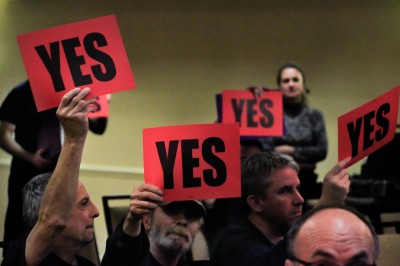
With contracts set to expire on Friday and limited time to settle on an agreement, Boston University workers voted Wednesday at the Holiday Inn in Brookline to authorize a strike if an agreement with BU is not achieved.
Workers started gathering at about 1 p.m. and continued until about 11 p.m., coming in on their own time to receive updates from members of the bargaining committee and leaders from the 32BJ Service Employees International Union about where contract negotiations stand and place their vote to authorize a strike by holding up a “Yes” or “No” sign, said Eugenio Villasante, spokesman for 32BJ SEIU.
“We want to remind the university, student body that the workers make the university run and without them, it would be different,” he said. “Strike isn’t something people take lightly. When folks think about this, people deciding in the next few days what their livelihood will be for the next four years, it’s something people need to think of carefully.”
Voting “yes” does not guarantee that workers will actually strike, Villasante said. Results from the vote were not available at press time.
BU workers are considering a strike because of the conditions in their new contract that they consider to be unfair, said Roxana Rivera, district leader of the 32BJ SEIU.
“What we’re asking for is a cost of living wage increase that will keep up with inflation over the next coming years,” she said. “BU is doing very financially well, projected to as well, and so we believe it’s only fair for workers to be able to not fall behind in the coming years that they get that cost of living wage increase.”
The Boston City Council showed its support for BU workers by voting unanimously Wednesday for a resolution to ask the university to agree on a fair contract, Rivera said.
Workers and union leaders first marched down Commonwealth Avenue to BU President Robert Brown’s office at 1 Silber way on Oct. 15, The Daily Free Press reported. They held another march Tuesday to put last minute pressure on the university, The Daily Free Press reported.
Another important issue for the union is increasing health care costs, Rivera said.
“Workers on the average right now pay $400 a month to have health care,” she said. “People already paying the $400, they’re going to continue doing that. We’re not asking them to pay less. We’re just saying that they can’t take the burn of paying more over the coming years.”
Timothy Hall, the lead custodian and a member of the bargaining committee, said he believes the decision to receive strike authorization will be “pretty much unanimous,” but he is concerned about the effect it will have on workers’ relationship with BU administration.
“What we’re afraid of is that we’ve had this great relationship in the 36 years I’ve been here, when we’ve been looked upon as the best custodial and trade working force at least in the city of Boston,” he said. “Over the past few years, they’ve stopped recognizing that at the table because the offer they [BU] is coming across as far as wages are concerned isn’t even [with] the projected cost of living index.”
Jose Martinez, another custodial worker on the bargaining committee, said he hopes Brown becomes more sensitive about how his administrative decisions affect workers.
“Having to fight in a way we never had to saddens people who have been here a long time,” he said. “I’m hoping we come to an understanding. I hope President Brown takes a look at who the members of 32BJ are. They’re good people. We don’t like being placed in this position. We’ve never been cornered in such a position as we are now.”
John Griese, a member of Student Labor Action Project present at the vote, said the group would support the worker’s decision to strike and stand with them on the picket lines.
“I’m here because worker’s issues are student’s issues. Students will be workers, and even with the degrees they have, they will have to deal with the dynamics of labor and capital markets,” Griese, a senior in the College of Engineering, said. “We want to make BU a good place for whoever is part of the institution. I’ve seen wonderful solidarity, and it’s one of the most amazing things I’ve seen at BU in my four years.”
Several workers who voted said the strike could be used as a tool to reach agreements with the university.
Alfredo Steward, 38, a heat, ventilation and air conditioning mechanic, said he liked how the bargaining committee spoke “straight and to the point” about the contracts and where BU workers stand.
“I’ve been working at BU for 18 years,” he said. “I am hopeful how things end up because we all have families. This vote shows that we’re serious about negotiations, and we’re not backing down. We want the respect. I don’t want to go on strike, but sometimes you’ve got to stand up for what you want. Tuition goes up each year, and so does the money President Brown makes.”
Sue Friedlander, 52, a custodian in West Campus, said being treated with respect is just as important as being paid a decent wage.
“We just want some respect and to be paid a fair wage. Everything in the city has gone up, and the wages we make aren’t keeping up,” she said. “When I first started here six years ago in 2008, I made $14.66 an hour, and it’s not enough. That’s not right.”




















































































































